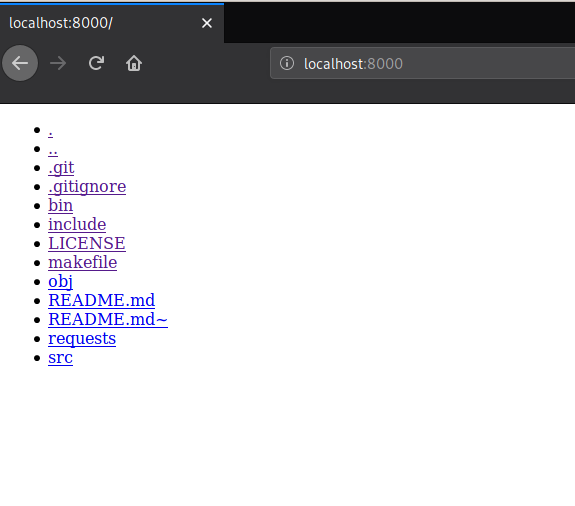File indexer
It works under Linux. It has not been tested on Windows.
Compilation
It suffices to do:
mkdir bin obj
makeTest
From one terminal, we should do, once compiled:
./bin/file-indexer 8000 .This would mount this folder in the 8000 port. We have a test file named requests into this directory. To test the concurrent requests it contains, we should do, from another terminal:
cat requests | while read n; do printf "%q\n" "$n"; done | xargs -P 4 -I % bash -c %This last test generates 4 concurrent requests, whose result will sometimes be unordered. An example:
<!DOCTYPE html>
<html>
<body>
<pre>
<!DOCTYPE html>
<html>
<body>
<pre>
#ifndef FILE__H
#define FILE__H
#include <string>
#include <vector>
#include <dirent.h>
#include <sys/stat.h>
using std::string;
using std::vector;
class File {
private:
string path;
public:
File(string path);
bool is_file();
bool is_folder();
vector<string> list_files();
File operator /(string file);
string get_path() {
return path;
}
};
#endif
#ifndef SERVER__H
#define SERVER__H
#include <unistd.h>
#include <cstdlib>
#include <string>
#include <vector>
#include <fstream>
#include <sys/types.h>
#include <sys/socket.h>
#include <netinet/in.h>
#include <fcntl.h>
#include <iostream>
#include "file.h"
#define BACKLOG 5
using std::string;
using std::vector;
using std::ifstream;
using std::cout;
using std::endl;
struct HttpResponses {
string NOT_FOUND();
string OK(string msg);
};
class Request {
private:
int fd;
string root_folder;
const int BUFFER_SIZE = 1024;
HttpResponses responses;
public:
Request(string root_folder, int fd);
void answer();
};
class FileServer {
private:
int socket_fd;
string root_folder;
public:
FileServer(int port, string root_folder);
Request await_request();
};
#endif
</pre>
</body>
<!DOCTYPE html>
<html>
<body>
<h1> Not Found </h1>
</body>
</pre>
</body>
</html>
</html></html><!DOCTYPE html>
<html>
<body>
<h1> Not Found </h1>
</body>
</html>
